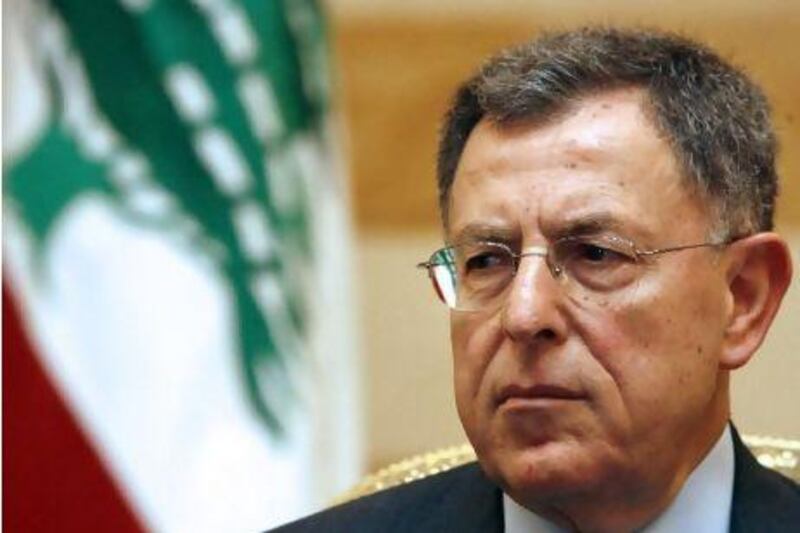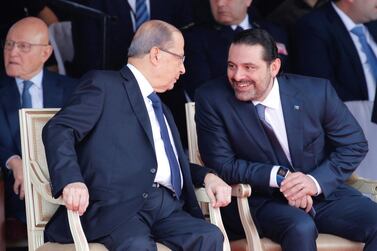Former Prime Minister of Lebanon Fouad Siniora has accused Christian leaders of making a “major historical mistake” as they push for more power against a backdrop of financial difficulties and increased pressure from the US against one of the country’s most powerful parties, Hezbollah.
“Christians are fighting a losing battle in terms of numbers. They should try to emphasise their role instead of numbers,” he said, referring to president Michel Aoun’s attempts to increase the political influence of Christians in Lebanon.
Mr Siniora used an interview with The National on Wednesday to reflect on Lebanon's current challenges both domestically and regionally, as Prime Minister Saad Hariri is meeting US officials in an attempt to hold back sanctions on Hezbollah that could destabilise the government and the fragile economy.
Despite multiple promises, the small Mediterranean country has proved incapable of implementing rapid economic reforms to avoid a looming economic crisis because of political infighting that recently brought the government to a 40-day halt. In parallel, Lebanon fears being embroiled in US-Iran tensions in the Gulf because of the military power wielded by Iran-backed Hezbollah, the only party to have kept its weapons after the end of the Lebanese civil war in the name of the fight against Israel.
Mr Siniora said the country was facing “resistance” to reform from many political parties, particularly president Aoun’s Free Patriotic Movement.
One of Mr Aoun’s core policies is to restore the rights of Christians in Lebanon, a strategy he demonstrated recently when he delayed signing the 2018 budget for several days in protest against an article that included the appointment of nearly 1,000 civil servants that had successfully passed national exams two years before because only a small minority of them were Christian.
Though Mr Aoun agreed to sign the budget, he then asked the speaker of parliament in a letter to clarify the constitution, stressing that it was essential to preserve Lebanon’s “national consensus and shared life”, which he described as “essential”, reported Lebanese newspaper The Daily Star. The matter has not been discussed publicly since.
Critics of Mr Aoun such as Mr Siniora argue that the president’s request is contrary to the constitution that clearly stipulates that sectarian balance should only be maintained for top civil servants such as ambassadors.
Based on a 1932 census showing that Christians were a majority in Lebanon, a 76-year-old unwritten agreement stipulates that the president should be Christian Maronite, the prime minister Sunni Muslim and the parliament speaker Shiite Muslim.
Though recent research suggests that demographics have changed and that the largest community today is Shiite Muslim, followed by Sunni Muslims and Christians, no new census has been conducted to avoid disturbing the country’s fragile balance of power.
This controversy is one of the many examples of the failure of Lebanese leaders in general, not only Christian leaders, to address the dire political and economic situation, argued Mr Siniora. “Politicians are not really acting in a responsible manner. Lebanon can no longer afford the luxury of wasting time,” he said.
Lebanon is one of the most indebted countries in the world. Its international reserves fell to $38.7 billion last year, enough for 13 months of import coverage. To unlock funds of nearly $11 billion pledged in Paris in April 2018, the country promised to implement drastic reforms, but has remained paralysed by political infighting. A new garbage crisis, similar to the one that sparked protests in 2015, is looming.
One of the current prime minister Saad Hariri’s closest allies and a member of his Future Movement, 76-year-old Mr Siniora headed the party’s bloc in Parliament for nine years until 2018. As prime minister from 2005 to 2009 and finance minister for two terms in the 1990s and early 2000s, Mr Siniora played a defining role in shaping Lebanese politics.
A former banker, he is remembered for having introduced value-added tax (VAT) in 2002. However, other necessary economic reforms were not implemented because of resistance from other political parties, he said. “I confess that in many instances, I could not achieve what I really wanted.”
Syria's occupation of Lebanon also hindered reforms, Mr Siniora said. "Syria was playing the role of what you call in French pompier pyromane: igniting a fire and then offering its services to extinguish it."
Syrian troops entered Lebanon in 1976, one year after the beginning of the civil war, before being forced out 29 years later amid public outcry following the murder of Prime Minister Rafiq Hariri in 2005. His supporters believe Syria orchestrated the murder, but Damascus denies this.
Mr Siniora has often clashed with Iran-backed Hezbollah, which accuses him of corruption, a charge he rejects. “Hezbollah interferes in domestic affairs in a number of countries ranging from Syria, Iraq, Yemen, and probably others. All this is contrary to the interest of the Lebanese,” he said.
The US is running out of patience with Hezbollah's increasing political and military prowess. Several sources previously told The National that it is likely to impose fresh sanctions on the party and its allies. Mr Siniora said that he hoped that Mr Hariri would convince American officials to focus instead on increasing their support for the Lebanese army, which it has assisted with aid worth more than $2.29 billion since 2005.
To counter Hezbollah’s influence, Mr Siniora has also been lobbying another Lebanese ally, Saudi Arabia, to increase its support to Mr Hariri. After a visit to Jeddah mid-July with two other former Lebanese prime ministers, “the king nicely mentioned the role of Saad Hariri and extended support,” he said. Asked whether any concrete announcements would be made soon by Saudi Arabia towards Lebanon, Mr Siniora answered “give them time. They have been busy with the Hajj.”







